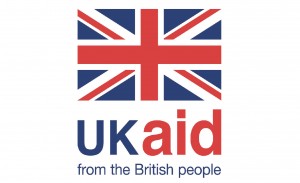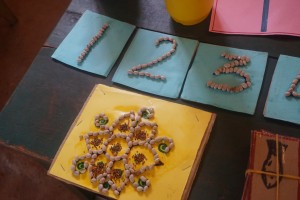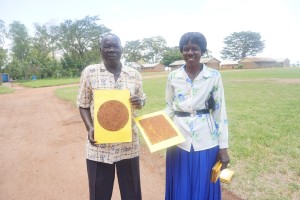Jumpstart! news update: Making Acholi learning aids from local materials!
September 24, 2015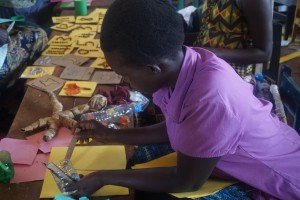 When we visited the classrooms at Anaka Primary 7, every inch of wall space was occupied by colourful learning aids depicting letters, numbers and local folk tales. The school was hosting an African Revival Jumpstart! training workshop for teachers from local nursery schools that focused on:
When we visited the classrooms at Anaka Primary 7, every inch of wall space was occupied by colourful learning aids depicting letters, numbers and local folk tales. The school was hosting an African Revival Jumpstart! training workshop for teachers from local nursery schools that focused on:
- How to make learning aids from raw local materials at nursery level
- Using learning resources in the local Acholi language
The participants learned how to source raw materials from the natural environment and use them to make a variety of educational equipment in the local Acholi language.
Local materials are an incredibly cheap source of learning aids, and also familiar to the children, which helps to facilitate their understanding of new concepts. Teacher trainer Martina explained how using learning aids made of local materials can help children to master their environments:
‘The children develop a precision for what is in their environment. When they see a pot made of clay, they know what clay is called, they begin to value and appreciate their environment and later they can also develop skills in making those materials themselves, helping them professionally later on.’
Furthermore, nursery-teaching resources written in the local Acholi language enhance the students’ learning because it is the language they use at home.
The language of instruction throughout the schooling system in Uganda is English. However, research confirms that children learn best in their mother tongue as a prelude to bilingual education because it allows them to develop stronger reading, writing and mathematical skills. This lays the foundations for their future education and acquisition of more complex concepts. Moreover, using Acholi language materials can boost the self-confidence and motivation of pupils and increase their interest in what they are learning – because they understand it! Martina described the benefits of using Acholi learning aids:
‘Firstly, the children in the nursery schools are still developing their language and still using the local language at home. So we hope that, when they come to school and get materials in the local language, they will develop their language skills fast because they understand it. At home we call a pot ‘agulu’ – when they come to school they also find ‘agulu’, so they develop reading and writing skills faster.
But teacher trainer Ojok Ojara, who underwent two years of ECD teacher training in Australia, admits there are some challenges persuading the local communities of the benefits of teaching nursery and primary classes in Acholi:
‘People think that when you teach in Acholi, you are not teaching in English. But you can teach in both! Let the children develop the language they really use at home, let them master it. They will learn the second language very quickly.’
Ojok Ojara is now advocating for the introduction of English only after children have completed class 3 of primary school, aged 8. Indeed, children who have a firm grounding in Acholi and have been given the opportunity to develop skills and conceptual understanding in their mother tongue, will learn English quicker than children who have been instructed purely in English. In addition, they are more empowered as learners when taught in their mother tongue, which they can now study all the way to university level in the Ugandan education system
The African Revival training focused on the importance of the use of Acholi in the classroom, while also showing participants practical ways of incorporating the language into the classroom using handmade learning aids. Trainers Martina and Ojok Ojara expressed their firm hope that the teachers would take away the new techniques and adapt them to their own classrooms, and plan to monitor their progress. But the level of motivation amongst the trainees is high. When asked if he enjoyed the training sessions, nursery teacher Kuluse admitted:
‘Yes! In fact yesterday I didn’t sleep. I spent most of the night working on my learning aids, because I thought I will make a lot of things that will help me in class, so I’ve really achieved a lot in this training.’
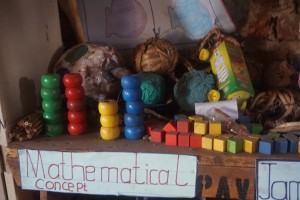 We hope he doesn’t stay up every night making new resources – teaching is a tiring job! Kuluse is clearly very passionate continuing professional development for teachers, which he sees as the key to raising education standards in Uganda, and hopes to share his new knowledge with his colleagues. He also views Early Childhood Development as integral to his nation’s progress:
We hope he doesn’t stay up every night making new resources – teaching is a tiring job! Kuluse is clearly very passionate continuing professional development for teachers, which he sees as the key to raising education standards in Uganda, and hopes to share his new knowledge with his colleagues. He also views Early Childhood Development as integral to his nation’s progress:
‘Nursery education is the foundation of our nation. If the foundation is built well, our dreams for Uganda will all come to pass’
With more and more Acholi being introduced into nursery education, in conjunction with vibrant, engaging and locally sourced learning aids, we are sure this foundation is growing stronger by the day.

